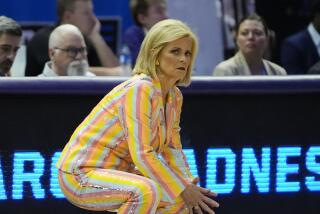Misery Likes Company : Webber Just One of Many Athletes Who Have Made Memorable Blunders
With 11 seconds remaining, with 64,000 fans screaming, with 55 million viewers watching, 20-year-old Michigan sophomore forward Chris Webber signaled for a timeout he didn’t have, the resulting technical foul thereby eliminating any chance his team might have had of defeating North Carolina for the national championship.
For anyone who has ever played organized sports at any level there lurks the memory of such an inglorious moment when an important game was lost because a ground ball was muffed, a free throw missed, or a touchdown negated because of some mental lapse.
While most of us could feel for Webber in his hour of anguish, there are those whose identification is much stronger, those whose victimization at the hands of fate also took place on a national stage.
Bill Buckner batted .289 in 22 major league seasons, yet he will always be remembered for the easy ground ball he booted in the sixth game of the 1986 World Series that eventually cost the Boston Red Sox the championship.
Roberto De Vincenzo lost a chance to win the 1968 Masters when he signed a scorecard that was incorrect.
Roy Riegels was known his entire adult life -- and in his obituary March 27 -- by the nickname “Wrong Way” after he ran the wrong way in the 1929 Rose Bowl and cost his Cal team a victory.
But perhaps no one could understand what Webber was feeling last Monday night more than former Georgetown player Fred Brown.
Eleven years ago, on the same court, on the same day, against the same team, Brown, a sophomore, made a mistake that had the same consequences.
With 12 seconds to go in that game and Georgetown trailing 63-62, Brown, inexplicably, turned and passed the ball directly to North Carolina’s James Worthy as if he were a teammate. The play sealed the Tar Heels’ victory.
Today, Brown, 32, lives with his wife and three children on the campus of Episcopal High School, a boarding school in Alexandria, Va. Last Monday he was watching the Michigan-North Carolina game with his wife. When it happened, Brown turned to his wife and said, “The phone will be ringing tomorrow.”
He was right. Tuesday, Brown said he received 26 phone calls from media wanting to know if he had watched the game and what he thought.
“I felt for Chris Webber,” Brown said. “I saw his stare after the play. It was the same stare I had myself several years ago.”
Brown said he sat down Tuesday and wrote Webber a three-page letter.
“I told Chris that this was something he was always going to have to deal with,” Brown said. “I told him it was never going to go away but that he had to keep it in perspective. I told him that while he fell short of his goal he was not a loser.”
Brown said he doesn’t remember much about the night 11 years ago after he fell short of his goal. But he does remember the next morning.
“When I got up I remember thinking that the world hadn’t changed, that I still put my pants on the same way. The one thing I was worried about was how my teammates would feel. But when I got on the bus, no one said anything to me.”
To this day, Brown said he has never discussed the play with any of his former teammates.
One thing that did help Brown was the treatment he received from Georgetown Coach John Thompson. After the game, Thompson came over to Brown and smothered him in a hug.
“When coach Thompson came over and hugged me I just took it as par for the course,” Brown said. “I just assumed at the time that it was what any coach would do in that situation. That was the relationship coach Thompson had with his players. As I have gotten older and seen the way other people deal with situations, I’ve come to appreciate what he did more and more.”
Brown said he learned some valuable lessons from that 1982 game. He learned that his true friends would remain true and the jerks of the world would remain jerks.
“Even now I get people who say to me, ‘How much they pay you for making that pass?’ ” Brown said. (Since the game, some fans have screamed “timeout” at Webber.)
Brown won a championship ring with the Hoyas in 1984. But he said the aftermath was not what he expected. “Actually, I was quite depressed,” he said. “I thought, ‘this is all it’s about?’ ”
The adversity Brown endured in 1982 ended up having a positive impact on his life.
“That play changed my life,” he said. “I was always a person who strived for perfection. If I didn’t think I could do something perfectly, subconsciously, I wouldn’t get involved.
“As a young man who grew up in an impoverished environment (the South Bronx), I thought if you failed one time that you would be swallowed up. Then I fell short of my goal in front of millions of people.
“Since then I’ve tried a lot of other things in life and fallen short. But I might not have tried them if I still had the fear.”
Webber is destined for a long and lucrative career in the NBA (possibly as soon as next season). He will play in other big games, maybe even win a championship along the way. But like Buckner, De Vicenzo, Riegels and others, the mere mention of his name will always conjure up images of that fateful night in New Orleans.
It may not be fair and it may not be right. But that is the way it will be.
More to Read
Go beyond the scoreboard
Get the latest on L.A.'s teams in the daily Sports Report newsletter.
You may occasionally receive promotional content from the Los Angeles Times.










